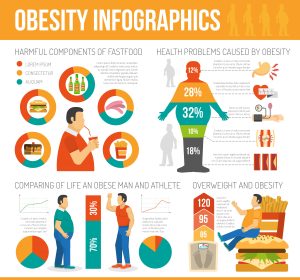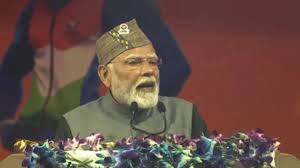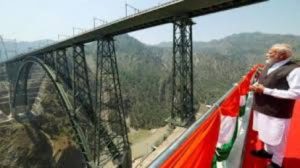Prime Minister Narendra Modi has launched a nationwide anti-obesity campaign, urging Indians to reduce oil consumption by 10%.
In his latest address, Prime Minister Narendra Modi once again proved his commitment to improving public health by launching a nationwide anti-obesity campaign. The campaign is aimed at tackling the rising obesity rates in India, a nation that has been grappling with both malnutrition and an increasing incidence of lifestyle diseases like diabetes, hypertension, and heart disease.
PM Modi’s speech on obesity not only highlighted the importance of adopting healthier lifestyles but also introduced an innovative approach to lead this change – the nomination of 10 influential individuals to spearhead the campaign.
What is Obesity?
Obesity is defined by the World Health Organization (WHO) as an abnormal or excessive accumulation of fat that poses a risk to health.
The most commonly used measure to assess obesity is the Body Mass Index (BMI). A BMI of 25 or higher is considered overweight, while a BMI of 30 or more is classified as obese.
Understanding the Growing Concern of Obesity
According to the World Health Organization (WHO), obesity has reached alarming levels in both children and adults, with major implications for the country’s healthcare system. The sedentary lifestyle, poor dietary choices, and an increasing reliance on processed foods have contributed to this crisis. The situation is concerning, as obesity is closely linked to various non-communicable diseases (NCDs), which burden India’s healthcare infrastructure.
In India, obesity is classified as follows:
- Overweight: A BMI between 23 and 24.9 kg/m².
- Obese: A BMI of 25 kg/m² or higher.
- Morbid Obesity: A BMI of 35 or more.

PM Modi’s speech was an acknowledgment of these challenges and a call to action for the citizens of India. The Prime Minister urged the population to recognize the importance of making simple yet impactful changes to their daily lives, starting with reducing the consumption of unhealthy oils.
He set an ambitious goal of decreasing oil consumption by 10% as a first step in the fight against obesity. He explained that even such a small change in dietary habits could have a profound impact on public health.
Nominating 10 Ambassadors for the Cause
One of the most unique aspects of PM Modi’s speech was his announcement of nominating 10 individuals to lead the charge in this national movement. These 10 people, selected from various fields, will act as ambassadors for the anti-obesity campaign. Their role will be to adopt healthy lifestyle habits, reduce their oil consumption, and encourage others to do the same. By nominating well-known personalities, PM Modi aims to set an example for the wider public and inspire them to take action.
OThe concept of nominating 10 individuals adds a personal, relatable element to the campaign. It’s an invitation to the people of India to participate in a national movement, where collective action can lead to significant public health improvements.
Government Initiatives to Address Obesity:
- National Health Mission (NHM) – NP-NCD: Focuses on early detection, screening, and behavior change to prevent obesity and related health issues through the National Programme for Prevention and Control of Non-Communicable Diseases (NP-NCD).
- Fit India Movement & Khelo India Programme: Encourages physical activity in everyday life with initiatives like the Fit India School Certification, while Khelo India promotes sports and athletic excellence by providing modern sports facilities.
- POSHAN Abhiyaan (2018): Aims to combat childhood obesity by promoting balanced nutrition and launching initiatives like Poshan Vatikas (Nutri-Gardens) to support homegrown, healthy food.
- Eat Right India Movement (FSSAI): Includes the ‘Aaj Se Thoda Kam’ campaign to reduce fat, salt, and sugar consumption and Front-of-Pack Labelling (FOPL) to help identify foods high in fat, salt, and sugar (HFSS).
- RUCO Initiative (FSSAI): Focuses on repurposing used cooking oil to prevent harmful fat consumption, converting it into biofuel instead of allowing it to be reused in food production.
Challenges in Addressing Obesity:
- Cultural Dietary Habits: The high consumption of carbohydrates, fried foods, and sugary snacks leads to excessive calorie intake.
- Limited Policy Implementation: While awareness programs are present, they often lack strong enforcement and community participation.
- Economic Barriers: Healthy foods are often more expensive than processed and fast foods, making unhealthy options more accessible.
- Lack of Physical Infrastructure: Insufficient parks, walking spaces, and fitness facilities discourage active living.
- Marketing Influence: Aggressive advertising by fast food companies fosters poor eating habits, particularly among children.
Way Forward:
- Nutritional Education: Schools and workplaces should focus on promoting healthy eating habits and proper portion control.
- Policy Reforms: Introduce taxes on sugary foods, subsidize healthier alternatives, and make nutritious food more affordable.
- Fitness Promotion: Implement mandatory physical activity programs in schools, workplaces, and urban development plans.
- Stricter Food Regulations: Ban trans fats, enforce clear labeling, and regulate misleading advertisements to protect public health.
PM Modi’s call for action is clear: tackling obesity is not just the responsibility of individuals but requires a collective effort that involves the government, public health institutions, and every citizen. While reducing oil consumption by 10% is a starting point, the campaign seeks to inspire deeper lifestyle changes, including better eating habits, increased physical activity, and a focus on mental well-being.
As the campaign unfolds, the spotlight will be on these 10 ambassadors who will play a pivotal role in shaping public perception and encouraging widespread participation. Together, with the support of government initiatives and the commitment of citizens, India can take the first steps towards becoming a healthier nation.



